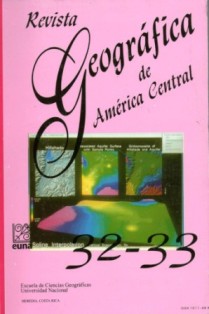¿EL ESTUDIO DE SISTEMAS DE INFORMACIÓN GEOGRÁFICA (SIGS) ES UNA DISCIPLINA? EL PAPEL IMPORTANTE DE LOS SIGS EN LA GEOGRAFÍA.
Abstract
Desde el nacimiento de la tecnología de los Sistemas de Información Geográfica (SIGs) a finales de los 70 (Tomlinson, 1984), han manifestado un gran impacto en como se trata el manejo de los recursos naturales, humanos y el ordenamiento territorial. Los SIGs se encuentran en la actualidad en casi todas las investigaciones clásicas de la disciplina de Geografía y recientemente aparece también en varias otras disciplinas que abarcan componentes de análisis de los elementos geográficos como el ordenamiento territorial, el análisis espacial, la optimización del manejo de los recursos naturales y de las redes de infraestructura socioeconómica (Marble, 1984). Los SIGs requieren un alto conocimiento de la información básica de la tecnología y su filosofía implantada para manejarlos con eficiencia y utilidad máxima para los objetivos de los proyectos presentes. Por esto el estudio de los SIGs es suficientemente complicado, sofisticado y necesario para alcanzar el nivel de disciplina individual. Este artículo demuestra la importancia de los SIGs en los estudios modernos del medio espacial e investiga la posibilidad de que contengan suficiente peso y contribución intelectual para ser verdaderamente una propia disciplina.
Downloads
How to Cite
Issue
Section
License
Proposed policy for journals offering Open Access
Authors publishing their works in the Journal acknowledge and agree to the following terms:
a) Authors retain the copyrights to their works and guarantee the Journal the right to be the first to publish their works, under the Creative Commons License Attribution-NonCommercial-ShareAlike 4.0 International, CC BY-NC-SA 4.0 International (https://creativecommons.org/licenses/by-nc-sa/4.0/deed.es), which allows others to share works upon complying with the acknowledgment of authorship and mention of the Journal as the original publisher of the work.
b) Authors are permitted to separately establish additional agreements for the non-exclusive distribution of the official edition of the work published in the Journal (for example, authors may desire to place the work in an institutional repository or incorporate it into a book that is to published elsewhere) so long they acknowledgment to recognize the Journal as the original publisher. The aforementioned additional agreements must respect the terms of the non-profit character and sharing philosophy of the original license (CC BY-NC-SA 4.0 International, https://creativecommons.org/licenses/by-nc-sa/4.0/deed.es).
c) Authors are encouraged to archive the post-print or editor/PDF version in Open Access repositories.






 REVGEO is licensed under https://creativecommons.org/licenses/by-nc-sa/4.0/deed.es
REVGEO is licensed under https://creativecommons.org/licenses/by-nc-sa/4.0/deed.es
.svg_4.png)

_(1).png)
_(1)_(1)_(1)_1.png)
(2)(1)(1)(1).png)
